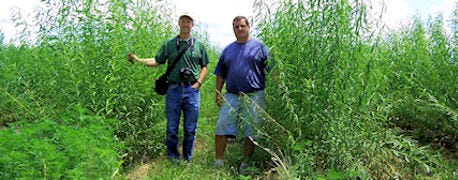
Expanded commercialization of shrub willow as a bioenergy crop moves a step closer, thanks to a $1.37 million grant for Cornell University researchers developing the newly mapped shrub willow genome. Cornell Horticulturist Larry Smart and Christopher Town, of the J. Craig Venter Institute in Rockville, Md., are partnering in a study the genetics of superior growth in hybrids of shrub willow, a fast-growing, perennial cool-climate woody plant.
The grant, funded by U.S. Department of Energy and USDA aims to boost growth efficiency and innovation of hybrid willows as a biofuel feedstock. It's the first project to take advantage of the recently mapped shrub willow genome.

CATCHING FIRE: Larry Smart (left) and willow-grower Dennis Rak are optimistic about the opportunities for large commercial and institutional users to develop willow-burning alternative energy technologies and for farmers to grow them on marginal farmland.
But Smart and Fredonia, N.Y., farmer/entrepreneur Dennis Rak envisioned the potential years ago. They've been working since 1998 to develop shrub willows with superior genetics at Rak's Double A Willow farm with funding by the New York Farm Viability Institute and others.
They've been unlocking the genetic mechanisms for superior hybrid growth via farm field trials. Finding the genetic fingerprint for superior hybrid vigor in parent species could cut the time it takes to identify even more promising progeny, says Smart.
"We think the results of this research will take years off the cycle time needed to find the best growing shrub willow hybrids," he adds. "With consistent increases in yield each cycle, we'll rapidly advance commercialization of this emerging bioenergy crop."
New potential for marginal cropland
Hybrid willows are already being grown on some of New York State's more marginal farmland. But Department of Ag and Markets officials estimate there's more than 1 million acres of poorly drained and otherwise underutilized land in New York alone.
Using this land to grow shrub willow is creating a new regional cash crop with far greater potential. Unlike corn or sugarcane, shrub willow doesn't need the more fertile soil used for the production of fruit, vegetables or livestock feed. It also needs less fertilizer and other inputs to thrive.
"Willow represents an important bioenergy crop for the Northeast. The hybrids that are being developed by Cornell have the potential to provide higher yields of more suitable biomass and with more efficient use of resources such as water," notes Town.
Improving shrub willow yields on marginal land is the main goal for Smart's willow breeding program which began in 1998. Smart also participates in projects to demonstrate its use and value to farmers, biofuels companies, small businesses and municipalities.
For more on this project, see May's feature article in American Agriculturist. Click on
About the Author(s)
You May Also Like




